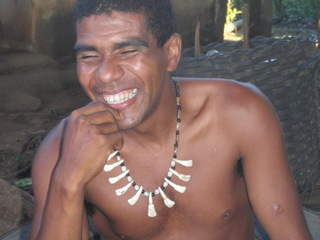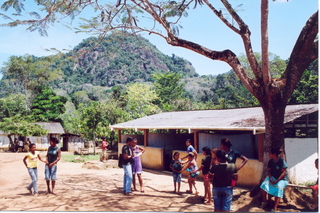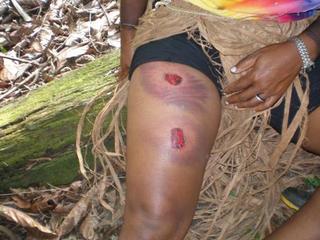Freedom for Tupinambá chief Babau, his brother and sister
Yesterday (16/8) chief Rosivaldo da Silva, better known as “Babau”, of the Tupinambá people, his brother Givaldo Jesus da Silva and his sister Gliceria Jesus da Silva were released from prison where they were waiting the preparations of a trial against them.
 The brothers and sister are the leaders of the community of the Serra do Padeiro, of the indigenous Tupinambá people, in the South of the state of Bahia, Brazil. The leaders have returned to their community. They will have to remain at the disposition of the authorities during the investigations of the allegations.
The brothers and sister are the leaders of the community of the Serra do Padeiro, of the indigenous Tupinambá people, in the South of the state of Bahia, Brazil. The leaders have returned to their community. They will have to remain at the disposition of the authorities during the investigations of the allegations.
Illegal arrest
Rosivaldo, better known as Babau chief, had been detained since March this year. He had been arrested by the Federal Police in his home during the night – which is illegal in Brazil. Givaldo was arrested days later, while repairing his car in town. Glicéria has been in jail of Jequié since June 2010. She was arrested along with her two months old son, when arriving at the Ilhéus airport on the way back from a meeting with President Lula in Brasilia, the day before.
 Struggle for land
Struggle for land
They are being accused of a series of crimes. They deny and no proof has been presented so far. The accusations are part of a broader conflict, which is about the struggle for the recognitions and demarcation of their traditional lands. Defined by the Federal indigenist state organ Funai, local ranchers, business men and politicians resist this demarcation process violently, which has created various violent conflicts over the years.
Criminalization
The arrests are part of pattern of persecution and criminalization of the Tupinambá leaders, a series of violent invasions by the Federal police over the last years, including cases of torture. The Indigenous Missionary Council (CIMI) has denounced over the years the severe criminalization several indigenous leaders in Brazil have suffered, such as the Xokleng, Guarani Kaiowá, the Xucuru and the Tupinambá.
As a strategy to create awareness among the public and to mobilize the public opinion, various campaigns were organized by social movements, both indigenous and non-indigenous, demanding freedom of the leaders Tupinambá. Also complaints were filed by the authorities about the case.
Complaints to the UN
In June this year, CIMI and Global Justice forwarded an elaborated complaint to the United Nations (UN) on the cases of torture and unlawful detention of the Tupinambá leaders. The document had international repercussions. In the complaint, the two entities reported in detail the illegal acts of the federal police in Bahia concerning the Tupinambá. Concluding: "The serious violence in the countryside – especially the suffering indigenous people of Brazil – is caused by a lack of accountability of public officials who violate rights, by the criminalization of leadership and the failure to implement the constitutional right to the demarcation of indigenous lands, recognition the value, dignity and rights guaranteed by the Constitution and international indigenous peoples. "
 History of police aggression
History of police aggression
The arrests of these leaders was not the first assault suffered by the Tupinambá. In 2008, during an attempt to arrest chief Babau, the Federal Police entered the village destroying the school of the community and assaulting Babau´s brother and the elder Jurandir Ferreira Mattos Guerreiro with rubber bullets. Two days later, about 130 officers returned to the community, with a large number of officers and cars, realizing a violent invasion. They destroyed furniture, burned fields and injured dozens with rubber bullets.
Last year, new arbitrary acts were committed. Five members of the Tupinambá community were arrested and suffered abuse of power by agents of the Federal Police. One of the victims was a woman. During this illegal action, they were sprayed with pepper spray and three of them received electric shocks, on several parts of their body – including in the genital region –, leaving burns. This treatment was confirmed by the Legal medical Institute of Brasília. The responsible officers were not punished.
Photos:
-
Chief Rosivaldo da Silva, better known as "Babau"
-
The school of the Serra do Padeiro, in the background the holy mountain that gives the name to the community
-
Wounds inflicted by rubber bullets of the Federal Police

